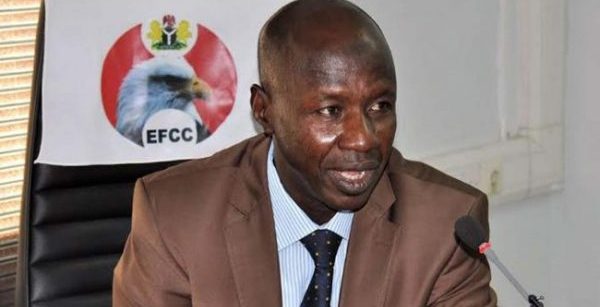Politics
Court says EFCC has no right to probe states’ finances

A Federal High Court in Ado Ekiti on Tuesday told the Economic and Financial Crimes Commission (EFCC) that it cannot probe states finances.
According to the court, the anti-graft agency can only do that with a report of indictment from states’ Houses of Assembly.
Justice Taiwo O. Taiwo made the declaration in a judgement
delivered in a suit filed by Ekiti State Government against the EFCC, the Inspector General of Police, the Speaker, Ekiti State House of Assembly, the Clerk and 13 others.
The state’s Attorney General filed the suit after the commission sent letters of invitation to some government officials seeking details of some financial transactions of the state.
The EFCC also sent letters to the banks seeking financial books of the state in their custody.
Justice Taiwo Taiwo held that the EFCC cannot usurp the oversight functions vested in state assembly under Sections 128 and 129 of the 1999 Constitution to initiate a probe or criminal proceedings against a state official.
He said the financial institutions are not entitled to submit, release to or in any manner whatsoever to disclose to any person, body or agency, including the EFCC and IG, or any other investigating body, any document, financial records etc.
According to him, only the state legislature is vested with oversight and investigation role over state finances, appropriation and implementation after receiving a formal report from the Auditor General or the Accountant General as the case may arise.
Referring to section 125 (c) of the constitution, Justice Taiwo said, “It is unassailable that there is separation of powers.
“Under a federal system, section 4, 5 and 6 of the Constitution provides separation of powers which guarantees independence and disallow encroachment of powers.
“The power for control of fund, financial outflow, appropriation are vested in the House of Assembly.
“It is the Auditor General of the state that has the power to conduct check on all government corporations and to submit his report to the Assembly.
“Nobody including the court can read other meaning into the clear provision of the constitution.
“The Assembly has the responsibilities on the management of funds by the executives. They have the responsibility to ensure fund management, cut wastages, reject corruption.
READ ALSO: All EFCC actions against you are lawful, court tells Patience Jonathan
“The first defendant (EFCC) is bound to operate within the constitution and cannot operate like the lord of the manor. Its
statutory duty is not a licence to contravene the Constitution.
“I can’t by any stretch of imagination see how the statutory functions of the (EFCC) can extend to a state in a federation under any guise to the extent that the eight to 18 defendants (banks) will be directed to submit bank details.
“Yes, the first defendant can investigate any person or corporate organisation, what it can’t do is to usurp the powers of the Assembly.
“The Federal Government cannot impose it’s statutory duties on a state in flagrant disobedient of the constitution. The prosecution should not ride roughshod of the constitution. It is the duty of judges to ensure they don’t listen to sentiment of the public. I resolve all issues in favour of the plaintiff. I grant all reliefs sought by the plaintiff in view of the fact they are live issues.”
RipplesNigeria… without borders, without fears
Click here to join the Ripples Nigeria WhatsApp group for latest updates.
Join the conversation
Support Ripples Nigeria, hold up solutions journalism
Balanced, fearless journalism driven by data comes at huge financial costs.
As a media platform, we hold leadership accountable and will not trade the right to press freedom and free speech for a piece of cake.
If you like what we do, and are ready to uphold solutions journalism, kindly donate to the Ripples Nigeria cause.
Your support would help to ensure that citizens and institutions continue to have free access to credible and reliable information for societal development.
























